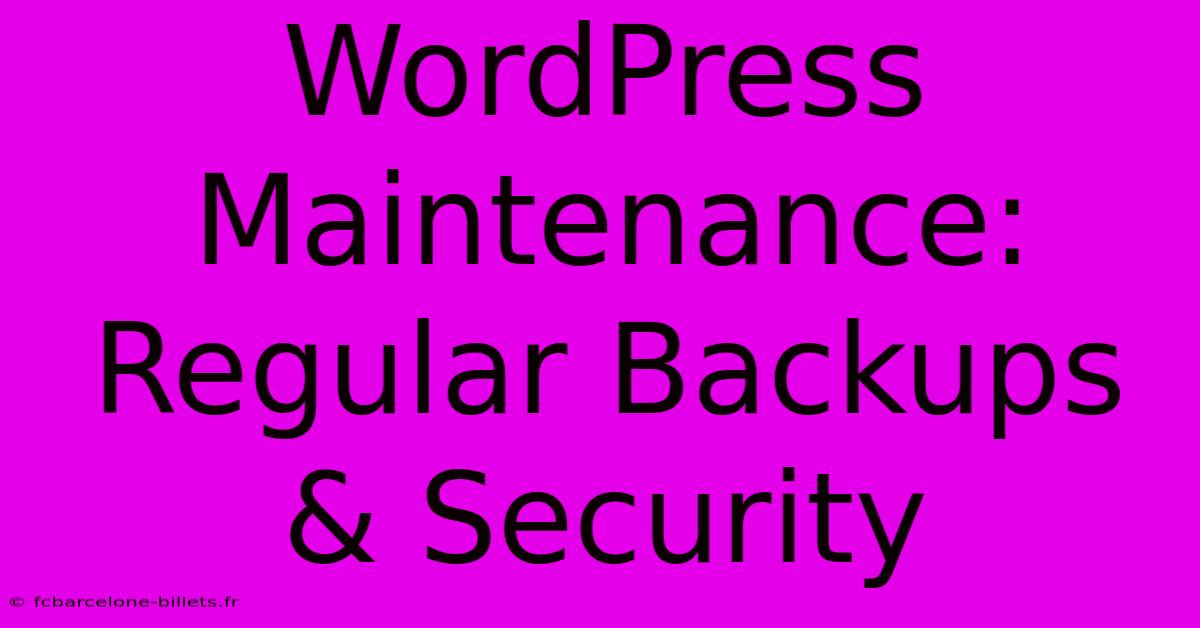WordPress Maintenance: Regular Backups & Security

Table of Contents
WordPress Maintenance: Regular Backups & Security
Maintaining a WordPress website requires more than just creating compelling content. A robust maintenance plan, focusing on regular backups and stringent security measures, is crucial for protecting your investment and ensuring your site's longevity. Neglecting these aspects can lead to data loss, website downtime, and potential security breaches. This article will guide you through essential WordPress maintenance practices to keep your site running smoothly and securely.
The Importance of Regular Backups
Think of backups as your website's life insurance. They're your safety net against unforeseen circumstances, ranging from accidental deletions to malicious attacks. Without regular backups, recovering from a disaster can be incredibly difficult, time-consuming, and potentially costly.
Types of Backups:
- Full Backups: These capture everything – your database, files, and themes. They provide the most comprehensive protection but take longer to complete.
- Incremental Backups: Only changes made since the last backup are saved, making them faster and more efficient storage-wise.
- Database Backups: Focus solely on your website's database, essential for restoring content and settings. Helpful as a quick recovery method for content issues.
Best Practices for Backups:
- Frequency: Aim for at least daily backups for high-traffic sites, and weekly backups for less active sites. The more frequently you back up, the less data you'll lose in the event of an issue.
- Storage: Store your backups offsite. Consider using cloud storage services (like Amazon S3, Google Cloud Storage, or Dropbox) to protect against local hardware failures.
- Testing: Regularly test your backup restoration process to ensure everything works as expected. Don't wait until a crisis to discover a flaw in your backup system!
- Version Control: Keep multiple backup versions, allowing you to revert to an earlier state if needed.
Strengthening Your WordPress Security
A secure WordPress site is a healthy website. Proactive security measures significantly reduce the risk of hacking, malware infections, and data breaches.
Essential Security Practices:
- Strong Passwords: Use long, complex passwords for all your WordPress accounts (admin, users, hosting). Consider using a password manager to help you generate and manage strong passwords securely.
- Regular Updates: Keep your WordPress core software, themes, and plugins updated to the latest versions. Updates often include critical security patches.
- Two-Factor Authentication (2FA): Implement 2FA for added security. This requires a second verification step beyond your password, making it much harder for unauthorized users to access your account.
- Security Plugins: Install a reputable security plugin like Wordfence or Sucuri Security to enhance your website's defenses. These plugins offer features like malware scanning, firewall protection, and login security.
- Limit Login Attempts: Configure your WordPress settings or use a security plugin to restrict the number of failed login attempts. This helps prevent brute-force attacks.
- Secure Hosting: Choose a reputable hosting provider with robust security features, including SSL certificates and regular security audits.
- HTTPS: Ensure your website uses HTTPS to encrypt communication between your website and visitors' browsers. This protects sensitive data transmitted to and from your site.
- Regular Security Audits: Periodically scan your website for vulnerabilities using security tools or hire a security expert to conduct a thorough audit.
Identifying and Responding to Security Issues:
- Monitor website activity: Pay close attention to any unusual login attempts, sudden drops in website performance, or suspicious comments.
- Regularly check your server logs: Look for signs of unauthorized access or suspicious activity.
- Back up your website immediately: If you suspect a security breach, back up your website before taking any action. This ensures you have a clean copy to restore if necessary.
- Contact your hosting provider: If you're unsure how to handle a security issue, contact your hosting provider for assistance. They can often provide valuable insights and support in addressing security problems.
Conclusion: Proactive Maintenance is Key
Regular backups and proactive security measures are not optional; they're essential components of maintaining a healthy and successful WordPress website. By implementing the strategies outlined in this article, you can significantly reduce the risk of data loss and security breaches, ensuring your website remains online, secure, and operating at its best. Remember, prevention is always better – and cheaper – than cure!

Thank you for visiting our website wich cover about WordPress Maintenance: Regular Backups & Security. We hope the information provided has been useful to you. Feel free to contact us if you have any questions or need further assistance. See you next time and dont miss to bookmark.
Featured Posts
-
Fabrica Barcelona More Than Just A Building
Apr 07, 2025
-
Get Active Get Social Barcelona Houston Soccer
Apr 07, 2025
-
Last Minute Deals Barcelona To Morocco Cruises
Apr 07, 2025
-
Barcelona Calling Book Your Crowne Plaza Stay
Apr 07, 2025
-
Van Gogh Museum Barcelona A Day Of Artistic Inspiration
Apr 07, 2025
